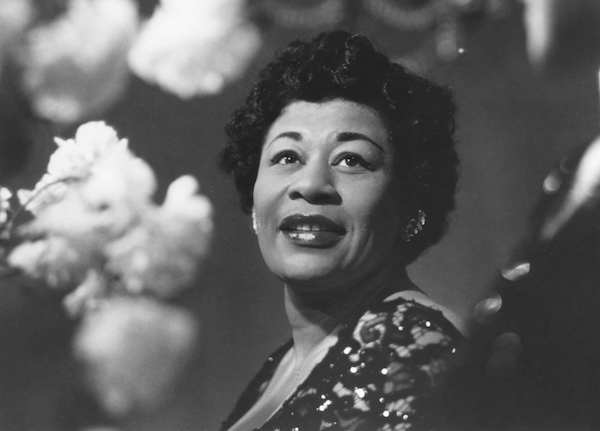Jan 13, 2026 2:09 PM
More Trump-Kennedy Center Cancellations
The fallout from the renaming of the John F. Kennedy Center for the Performing Arts to include President Donald…

An Ella Fitzgerald collection, The Complete Piano Duets (Verve), finds the vocalist exploring her rapport with a variety of pianists.
(Photo: Verve/Downbeat Archives)Ella Fitzgerald mesmerized when she unleashed her virtuosic voice, especially when she engaged in quicksilver scats while fronting jazz orchestras. But she could be as bewitching when it came to ballads involving just her and a piano. The Complete Piano Duets (Verve 003151902; 70:49/76:37 *****) makes that perfectly clear.
Fitzgerald’s other major superpower was her interpretive brilliance. She could deliver any song because she brought so much respect and emotional care to its melodies and lyrics. So, it’s no coincidence that her renditions of Great American Songbook tunes rank as standard bearers.
When it came to Fitzgerald’s duo partners, pianist Ellis Larkins is possibly the most renowned. He established a rapport with Fitzgerald that was on par with the accord Billie Holiday sparked with Lester Young. And it’s the duets here with Larkins that are given the most attention—he’s featured on 20 of the set’s 43 tracks.
Larkins was one of those rare jazz pianists whose genius revealed itself as being a sublime accompanist, instead of being an exhilarating improviser or a noteworthy composer.
The compilation begins with music from Fitzgerald albums Ella Sings Gershwin (1950) and Songs In A Mellow Mood (1954). Milt Gabler produced both albums for Decca at a time when he was positioning Fitzgerald for more pop superstardom than jazzworld renown. And that might explain why she adhered so closely to the songs’ melodies. On the spunky “Looking For A Boy” and the forlorn “But Not For Me,” Larkins underscored Fitzgerald’s gleaming voice with orchestral-like sensibilities toward dynamics, pacing and rhythmic alertness.
Oscar Peterson was on the other end of the spectrum. Whereas Larkins came off as elegantly reserved, Peterson displayed devilish capriciousness. Although Fitzgerald worked with Peterson in Norman Granz’s Jazz at the Philharmonic touring ensemble, they didn’t officially team up as a duo until they signed with Granz’s Pablo imprint for 1975’s Ella And Oscar.
It’s fascinating to listen to Fitzgerald’s takes of George and Ira Gershwin’s “How Long Has This Been Going On?” with Peterson, as well as the version she recorded 25 years prior with Larkins. Of course, the obvious difference is the weightier quality of Fitzgerald’s voice as she aged. While her crisp articulation and precise intonation remained on the later version, she lost some of the girlish innocence conveyed alongside Larkins. With that, though, she imbued the lyrics with more worldly maturity and sassiness, accentuated by Peterson’s punchy, subtly coruscating approach to melody.
With Peterson, Fitzgerald cut loose like she never had with previous piano-duet partners. A perfect example of this is their take of Einar Aaron Swan and James Horner’s “When Your Lover Has Gone,” on which she follows Peterson’s frisky, stride-leaning solo with a scat exchange. Even when they both peacocked their virtuosity, the pair still could get at the emotional meat of the more bruising ballads, as evidenced on their reading of Mack Gordon and Harry Revel’s torchy “There’s A Lull in My Life” and their take of Billy Strayhorn’s “Lush Life.”
When it came to brooding, though, Fitzgerald’s best piano partner was Paul Smith, who contributed to many of her landmark songbook albums on Verve. Together, they shined at selling melancholy, as illustrated by the stunning, almost cinematic reading of Cole Porter’s “Miss Otis Regrets” and the stark treatment of Earl Brent and Matt Dennis’ “Angel Eyes” from 1960’s Ella Fitzgerald Sings Songs From Let No Man Write My Epitaph.
Tommy Flanagan was another important pianist in Fitzgerald’s orbit. They first officially collaborated in 1956 for a stint that last roughly a month and included a performance at the Newport Jazz Festival. They reconvened beginning in 1962 with an on-and-off run that concluded during the late 1970s. At one point, Flanagan even served as her musical director. That said, he appears only once on this compilation—a 1964 rendition of Billy May and Milton Raskin’s “Somewhere In The Night,” a tune taken from the live 1964 LP Ella At Juan-Les-Pins. The performance runs less than two minutes, but still offers a stirring beauty that reveals the musical magnetism between Fitzgerald and Flanagan.
Collectively, The Complete Piano Duets could rank as a revelation for those who solely associate Fitzgerald with extravagance and flash, while being only passingly familiar with her flickering, lo-fi ingenuity. DB

Belá Fleck during an interview with Fredrika Whitfield on CNN.
Jan 13, 2026 2:09 PM
The fallout from the renaming of the John F. Kennedy Center for the Performing Arts to include President Donald…

Peplowski first came to prominence in legacy swing bands, including the final iteration of the Benny Goodman Orchestra, before beginning a solo career in the late 1980s.
Feb 3, 2026 12:10 AM
Ken Peplowski, a clarinetist and tenor saxophonist who straddled the worlds of traditional and modern jazz, died Feb. 2…

The success of Oregon’s first album, 1971’s Music Of Another Present Era, allowed Towner to establish a solo career.
Jan 19, 2026 5:02 PM
Ralph Towner, a guitarist and composer who blended multiple genres, including jazz — and throughout them all remained…

Rico’s Anti-Microbial Instrument Swab
Jan 19, 2026 2:48 PM
With this year’s NAMM Show right around the corner, we can look forward to plenty of new and innovative instruments…

Richie Beirach was particularly renowned for his approach to chromatic harmony, which he used to improvise reharmonizations of originals and standards.
Jan 27, 2026 11:19 AM
Richie Beirach, a pianist and composer who channeled a knowledge of modern classical music into his jazz practice,…